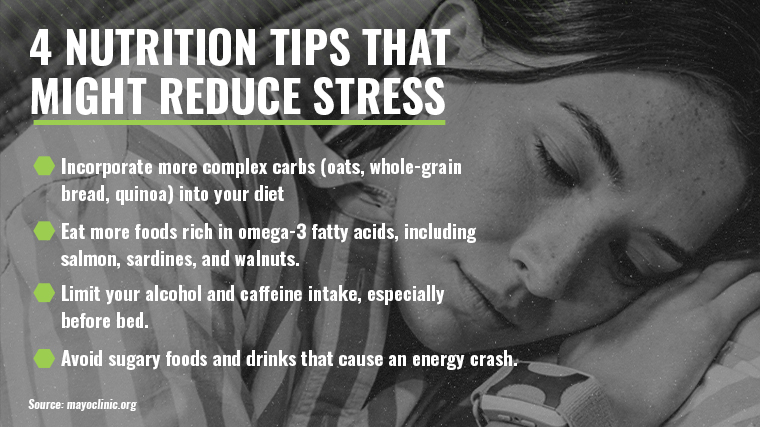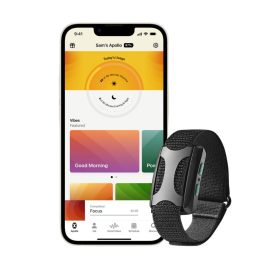You’re hitting the gym religiously, progressively overloading your lifts, and you’re on top of your protein intake. But the muscle gains still aren’t coming through. So what gives?
While it’s probably not the first thing that comes to mind, your stress levels may be to blame. Stress is a sneaky yet common culprit for halting your fitness progress. Many factors can contribute to both physical and mental stress — and if you’re always on edge and can’t seem to find ways to manage your stress levels, it may start affecting your muscle-building goals. In other words, prioritizing self-care, establishing a wind-down routine, and being more aware of your stress levels can help you build and maintain lean muscle.
That’s why BarBend teamed up with Apollo Neuro, makers of the Apollo wearable that helps your body build resilience and recover from stress through the use of soothing, gentle waves of vibration. Developed by neuroscientists and physicians, these vibrations — known as Apollo Vibes — are designed to promote improved relaxation, sleep, focus, and recovery by restoring balance to your nervous system.
For more, we’ve compiled four ways stress is killing your gym gains and three proven ways to help you combat it.
Apollo Neuro
Editor’s Note: The content on BarBend is meant to be informative in nature, but it should not be taken as medical advice. When starting a new training regimen and/or diet, it is always a good idea to consult with a trusted medical professional. We are not a medical resource. The opinions and articles on this site are not intended for use as diagnosis, prevention, and/or treatment of health problems. They are not substitutes for consulting a qualified medical professional.
4 Ways Stress Is Killing Your Gains
- Stress Interrupts Your Sleep
- You Won’t Recover as Fast
- It Might Cause Weight Gain
- It Can Mess With Your Hormones
1. Stress Interrupts Your Sleep
Your body needs sleep after a workout — it’s one of the most significant factors in muscle recovery. Stress throws an immediate wrench into the system, causing not only mild sleep disruptions but, sometimes, full-blown insomnia. In fact, a single night of sleep deprivation was shown to hinder muscle protein synthesis by a staggering 18 percent in a 2021 analysis in Physicological Reports. (1)
Muscle protein synthesis is the process of producing more muscle tissue, which is key for making gains. And the less sleep you get, the less muscle you gain, so catching those zzzs — at least seven hours per night — is paramount. Any less than that on a consistent basis, and you run the risk of slowing your recovery process. Another significant benefit of the Apollo wearable is that users get up to 30 more minutes of sleep a night, 19% more deep sleep, and 14% more REM sleep. Not bad!
2. You Won’t Recover as Fast
If you feel tired and weak at the gym after an abnormally stressful few days at school or work, it’s not all in your head: Higher stress levels are associated with worse recovery after a workout, according to a 2014 paper in the Journal of Strength and Conditioning Research. (2) And this goes beyond the sleep issues we already touched on.
In the study, researchers asked stressed-out students to complete six sets of heavy leg presses, and they found that those who reported higher levels of stress saw slower muscle recovery in the 96 hours after the session, with higher levels of perceived fatigue and soreness.
Your muscles grow during the recovery phase, but it takes your body longer to bounce back when dealing with increased stress, potentially causing the quality of your subsequent workouts to suffer.
3. It Can Cause Weight Fluctuations
It’s well known that stress leads us to turn to food for comfort. And while that’s certainly OK once in a while, making a habit out of it can lead to weight gain, which can impact your fitness in multiple ways. For one, stress increases your levels of the hormone cortisol. Higher levels of cortisol can cause your insulin to skyrocket and your blood sugar to drop, a rollercoaster that triggers cravings for sugary and fatty foods, per the Cleveland Clinic.

If you’re packing your diet with cheesy fries and glazed doughnuts instead of prioritizing lean protein when stressed, it’ll be way harder to maintain your muscle mass, let alone build more muscle. On top of that, holding onto extra pounds can make lifting and cardio more difficult and may lead to injuries down the road.
4. It Can Mess With Your Hormones and Decrease Strength
Chronically high stress levels can seriously impact your metabolism and hormones. As we detailed above, high cortisol levels can contribute to weight gain. And when you gain body fat, your metabolism naturally slows down. Body fat is less metabolically active than muscle (in other words, it burns fewer calories at rest), so holding onto more fat can lead to a sluggish metabolism. That can trigger a vicious cycle of gaining more fat.
What’s more, a 2014 study in the Journal of Clinical & Diagnostic Research states that stress hormones can cause muscle proteins to break down and, therefore, decrease your overall strength over time. (3) Not only that, but stress hormones can also damage your muscles in the long run. The study also found, though, that reducing stress can help improve sensory-motor performance and hand-grip endurance, which can both translate to better lifts. (Deadlifts, anyone?)
3 Ways to Lower Your Stress Levels
There are countless strategies to combat stress, and we’ve gathered three that almost anyone can take advantage of.
1. Prioritize Good Sleep
Sleep does so many great things for the body, one of them being reducing stress and improving your mood, according to the U.S. Office of Disease Prevention and Health Promotion. They recommend getting at least seven hours of quality sleep each night. But the keyword here is quality.
To help you get more restorative slumber, invest in light-blocking shades or wear an eye mask. You can also listen to a guided meditation to help you fall asleep faster. And one last thing: Halt all caffeine consumption at least six hours before bed.
2. Limit Screen Time
We get it — you have to be on your laptop and smartphone for work and play. But make sure to shut the screens off from time to time. A 2018 study in the journal Preventive Medicine Reports found that teens who spent at least four hours a day on their screens were twice as likely to have anxiety and depression than those who used their electronics for about an hour a day. In fact, subjects who were on their screens the most exhibited less curiosity, self-control, and emotional stability. (4)

Another study of 563 young adults (aged 18-22) found that participants who spent more time scrolling on social media (the average was 6.63 hours) also recorded greater symptoms of anxiety on a survey. (5)
And even if you’re not doomscrolling on your phone, using any sort of screen in bed can still play havoc with your sleep schedule, thanks to the melatonin-blocking blue light that screens emit. To reduce this risk, this article from Harvard Health Publishing suggests you avoid looking at bright screens (laptops, tablets, phones, etc.) at least two or three hours before bed.
3. Start Journaling Regularly
Putting pen to paper has some pretty positive effects on your mental health. A 2022 analysis in the journal Family Medicine and Community Health found that journaling helped people manage their anxiety. (6)
Journaling is a low-cost and widely accessible way to help deal with stress, deeming it a smart addition to your self-care routine. You can start by writing your thoughts in an empty notebook when you have some quiet time (say, right before bed or when you wake up). Or you can get a guided journal with prompts if you prefer not to freestyle.
The Family Medicine and Community Health study found that sticking to a journaling practice for at least a month showed the most stress-relieving benefits, so aim to make it a daily habit.
Apollo Neuro

Manage Your Stress Today
Stress is a known progress killer when it comes to fitness goals. The good thing is that you can recognize the roadblocks and take action against them. The Apollo wearable is designed to help you benefit from improved focus and concentration and reduce feelings of stress and anxiety, helping you crush your fitness goals as a result. Head here to learn more.
References
- Lamon, S., Morabito, A., Arentson-Lantz, E., Knowles, O., Vincent, G. E., Condo, D., Alexander, S. E., Garnham, A., Paddon-Jones, D., & Aisbett, B. (2021). The effect of acute sleep deprivation on skeletal muscle protein synthesis and the hormonal environment. Physiological reports, 9(1), e14660. https://doi.org/10.14814/phy2.14660
- Stults-Kolehmainen, M. A., Bartholomew, J. B., & Sinha, R. (2014). Chronic psychological stress impairs recovery of muscular function and somatic sensations over a 96-hour period. Journal of strength and conditioning research, 28(7), 2007–2017. https://doi.org/10.1519/JSC.0000000000000335
- K.N.Poornima,.N.Karthick,.R.Sitalakshmi,.(2014).Study of the Effect of Stress on Skeletal Muscle Function in Geriatrics,J Clin of Diagn Res. 8(1), 8-9.
- Jean M. Twenge, W. Keith Campbell. Associations between screen time and lower psychological well-being among children and adolescents: Evidence from a population-based study. Preventive Medicine Reports, 2018. https://doi.org/10.1016/j.pmedr.2018.10.003.
- Anna Vannucci, Kaitlin M. Flannery, Christine McCauley Ohannessian, Social media use and anxiety in emerging adults, Journal of Affective Disorders, Volume 207, 2017, Pages 163-166, ISSN 0165-0327, https://doi.org/10.1016/j.jad.2016.08.040.
- Sohal, M., Singh, P., Dhillon, B. S., & Gill, H. S. (2022). Efficacy of journaling in the management of mental illness: A systematic review and meta-analysis. Family Medicine and Community Health, 10(1). https://doi.org/10.1136/fmch-2021-001154
The post 4 Ways Stress Is Killing Your Gains appeared first on BarBend.

